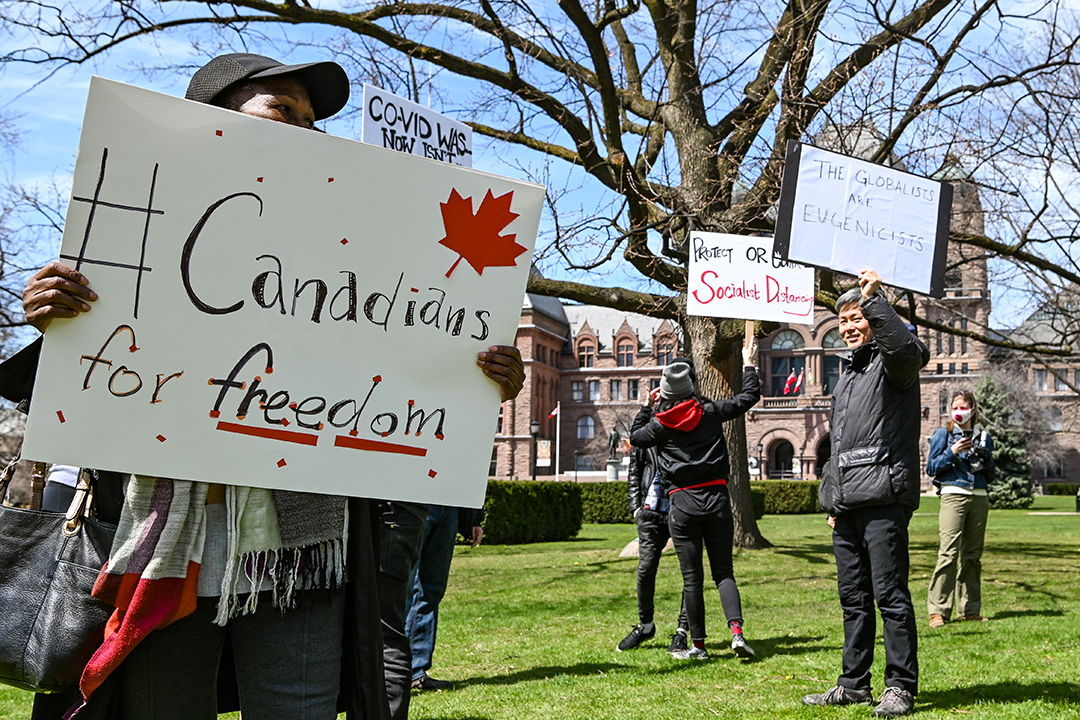I was sitting in my dorm last week watching an online lecture when I first heard them. Initially, I thought the vague, faint roar came from a stadium of fans at a varsity sports game. When it started to sound more like chanting, my mind went to another frosh week parade. But by the time I turned off my camera and went over to open my window, I could tell it was angry. I could tell it was an anti-vaxxer protest.
I wasn’t the only one who noticed. My U of T group chats flooded my phone with panicked texts. One girl was blocked from crossing University Avenue on her way back from class. Someone else took a photo of the protestors from a skyscraper.
It makes sense to feel negatively about anti-vaxxers. In hard times like this pandemic, it is natural to look for scapegoats, and the anti-vaxxer riot at Queen’s Park have provided a convenient herd. But even though we may think we have every reason to condemn the anti-vaxxer mob, dehumanizing and hating them won’t end this pandemic any faster. Having sympathy and understanding for them, as nearly impossible as that sounds, is the only way we can convince them to get vaccinated and finish our march to the end of the pandemic finish line.
When society blames individuals for high vaccine hesitancy rates, it evades responsibility for the structural issues that contribute to those rates. National polling done by Statistics Canada earlier this year showed that some racialized Canadians were more likely to report being reluctant to get the vaccine. Particularly, Black and Latin American Canadians were the least comfortable with getting the shot, with only 56.4 per cent and 65.6 per cent, respectively, reporting that they were somewhat or very willing to receive the shot as compared to the national average of 76.9 per cent. But it is important to note that these communities have experienced medical mistreatment throughout history, and still face discrimination due to the systems and policies within Canadian medical institutions.
The same survey showed a strong link between vaccine hesitancy and lower education levels. In total, around a quarter of Canadians are vaccine hesitant — too great of a number to just chalk up to individual failures. Society can’t brush off responsibility for its structural issues by just blaming individuals for not getting vaccinated.
We also can’t end this pandemic without seeing the protestors as individuals with unique reasons for not wanting to get the shot. The protestors we see on Bloor Street are just the tip of the needle of the Canadians we need to convince to get their inoculations. Beyond the screaming young men with “Make Canada Free Again” signs are people who are pregnant and unsure about the vaccine’s side effects on their babies, and elderly people led astray by Facebook algorithms while trying to browse family photos.
Differences within the anti-vaxxer movement do exist. The polling firm Abacus Data has found immense distinctions between those who are “vaccine hesitant” and those who are “vaccine refusers.” The “hesitant” category is surprisingly moderate; 61 per cent describe themselves as centrists on the political spectrum. In the “vaccine refuser” category, on the other hand, 73 per cent say COVID-19 is exaggerated or a hoax, and 90 per cent describe themselves as hating “the government telling [them] what to do.” Moreover, 40 per cent of vaccine refusers don’t trust their own doctors, compared with only 17 per cent of the vaccine hesitant. Only three per cent say they would get vaccinated if their friends and family said it was safe, compared with 24 per cent of the hesitant.
With such a wide range of beliefs, how can we convince more people to get vaccinated without trying to understand their different reasons for not doing so?
Furthermore, looking down on and ignoring the anti-vaxxers doesn’t mean they’ll go away; instead, that will worsen the problem. For instance, Prime Minister Justin Trudeau went from being sympathetic toward anti-vaxxers to antagonistic, and this change in attitude may have contributed to the surge in support for the People’s Party of Canada we saw in this past federal election.
As the Canadian Civil Liberties Union says, “We only have the right to vote every few years, but protests provide opportunities to express our views and grievances at any time.” These anti-vaccination protests are canaries in coal mines; without them, we wouldn’t know about this radicalization and the need to deal with it until it surfaced in a more nefarious way, like on election ballots or in the makeup of our parliament.
The next time I’m sitting at my desk and hear the now-familiar anti-vaxxer rampage, I’ll remember that my gut reaction to look down on the protestors is part of what is keeping me stuck in my dorm room in the first place. Otherism and demonization won’t help end this pandemic; the most important cure we need for the anti-vaxxer movement is a big injection of understanding and sympathy for the people in it.
Maeve Ellis is a first-year social sciences student at Victoria College.


